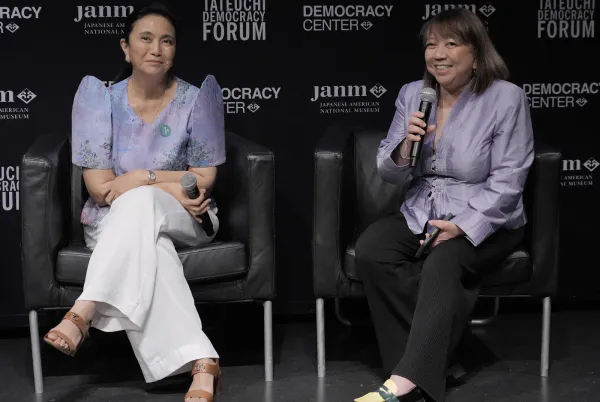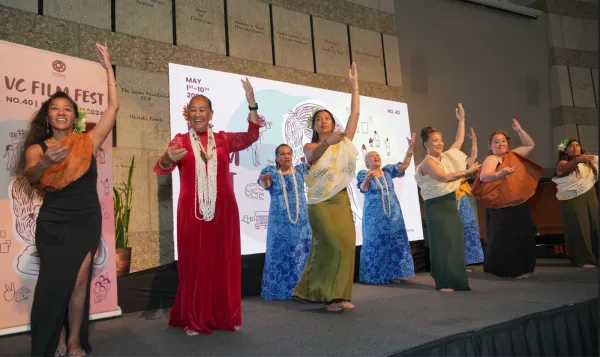THE TIDAL WAVE OF INDIGENOUS PACIFIC ISLANDER FILMS CONTINUES TO FLOW AT FESTIVAL
Shorts, documentaries, animation and features by and about the Pacific Islands’ Indigenous peoples are being highlighted from May 1-10 at various L.A. venues and via an online platform during the 40th annual VC Film Fest (formerly the Los Angeles Asian Pacific Film Festival). Since 1983 Visual Communications, a nonprofit organization, has presented this festival, dedicated to its mission “to develop and support the voices of Asian American and Pacific Islander filmmakers and media artists who empower communities and challenge perspectives.” Although the majority of the productions screened are by Asian and Asian-American filmmakers, VCFF is arguably America’s top portal for films of Oceania, as L.A. is cinema’s global capital.
As the main entry point for films of Polynesia, Melanesia and Micronesia, VCFF Fest also enables L.A. viewers to watch works they may not ever have the chance to see otherwise – particularly on the big screen. As a film historian who has been chronicling South Seas Cinema for decades, it’s inspiring to see the growth in Native Islander filmmaking. As evinced by the impressive current crop being screened by VCFF, the Tidal Wave of Indigenous Cinema continues to mature in terms of form and content. Here are capsule reviews of short films from Hawaii and Aotearoa/New Zealand, etc., at VCFF:
AIKANE
Kanaka Cartoon
This 14-minute short is beautifully animated by co-director Daniel Sousa with a South Seas sensibility. Aikane is set during the early contact period between European explorers/invaders. Its anti-colonial plot is interwoven with an LGBTQ theme, Polynesian traditional culture and mythology. There’s an interesting intersection between anti-colonialism and the acceptance of same sex relationships, even among warriors. (Take that, Alexander the Great!) There is a lovely underwater sequence with two male lovers cavorting amidst the marine life (an octopus plays an important role in the story). This is an interesting take on that cliché found in many South Seas Cinema pictures of scantily clad male and female lovers swimming beneath the waves or at waterfalls. With Sousa’s splendid animation, he and his co-directors Dean Hamer and Joe Wilson have made Aikane a stellar film to watch.
E MALAMA PONO, WILLY BOY
Divided Loyalties at the Frontlines
[NOTE: This review contains plot spoilers.] Like many of VCFF’s other Pacific Islander productions, director/co-writer Scott W. Kekama Amona’s E Malama Pono, Willy Boy deals with profound, serious social issues that have a ripped-from-the-headlines immediacy and power. Shot in glorious black and white, it is multilayered, startlingly complex for a 17-minute-long piece.
In the story, Native Hawaiian HPD officer Kupihea, nicknamed “Willy” or “Willy Boy” (Ioane Goodhue, who acted in Taika Waititi’s Next Goal Wins, Hawaii Five-O, NCIS: Hawaii, Magnum P.I.), is called at home and ordered to report for duty. In his household Willy Boy speaks in Hawaiian (a rarity in colonized Hawaii), which is a major clue for what will happen and becomes a bone of contention with his fellow Indigenous policeman, Officer Akina (Shawn Kahoolemana Naone), when they are dispatched to oust an “illegal” encampment of Native Hawaiians near Makaha, on the Waianae Coast of Oahu.
Like the pigs at UCLA, Columbia, etc., the HPD officers are being deployed to remove the Indigenous occupiers who are committing the cardinal sin in overpriced Hawaii: Living off the land and sea in their impromptu fishing village, rent free. In other words, these Hawaiians have the temerity to dare to live like their Indigenous ancestors in their own ancestral homeland. When the police arrive to force the occupiers off their seaside perch, they are met by chanting protesters. A wahine (woman) proclaims: “We’re treated like squatters in our own land.” A man asks the brown-skinned officers: “You’re Hawaiian. How can you do this?”
Officer Akina has a collaborationist attitude, and sneers at his fellow Hawaiians: “If this is living off of the land, I don’t care. I’ll never live like this.” As they roust the villagers from their campsites, he pilfers a knife. Keke (Kealiinoi Tengan), a frightened young Hawaiian girl, runs away from the raid and attempts to hide in her ohana’s (family’s) vehicle. In a clever fantasy sequence, she flies away in the pick-up truck.
Keke is Willy Boy’s cousin’s daughter, and he tries to peacefully coax her out from behind the driver’s seat. But when Officer Akina is more assertive, Willy Boy tries to urge his fellow policeman to use restraint, and Akina snaps: “You think you’re better than me because you speak Hawaiian.” He uses violent means to extricate her, leading to a scuffle with Keke’s father, who is then busted.
Willy Boy reaches the breaking point and joins his fellow Hawaiians who are protesting their eviction, and loudly chants defiant slogans in the Hawaiian language.
During the fishing village sequence, Mount Lahilahi – where I lived for a decade – can be seen in the distance; during the 1990s I covered an actual police raid at a real Native encampment near Makaha. I also heard a story about another land struggle at, I think, Hilo Airport. When police arrived to break-up the demonstration, the Hawaiian officers were so ashamed at being used in this way against fellow Kanaka Maolis that they reportedly took off their helmets and threw them onto the tarmac.
So, E Malama Pono, Willy Boy has the ring of truth. Given the current raids at pro-Palestinian encampments occupying college campuses across America, Amona’s stirring, gripping short presciently has its finger on the pulse of current events. The title can roughly be translated into English as: “Take Care of Righteousness, Willy Boy.” Furthermore, on yet another level, the title seems to be a reference to the superb 1969 Western movie Tell Them Willie Boy is Here, about a real-life Paiute (played by Robert Blake, co-starring Robert Redford and Katharine Ross) who defied the police in California in the early 20th century. Tell Them Willie Boy is Here was co-written/directed by one of Hollywood’s greatest rebels, Abraham Polonsky, who was blacklisted in the 1950s for being a Communist Party member. (Hawaiian superstar Jason Momoa co-wrote, executive produced and acted in a 2022 remake, The Last Manhunt, which co-starred Lily Gladstone, who was Oscar-nommed for Best Actress for 2023’s Killers of the Flower Moon.)
Amona’s E Malama Pono, Willy Boy is one of those shorts that is so compelling that it cries out to be expanded and turned into a full-length feature. BRAVO! Maika’i nui! (Screened during the 2023 Film Fest.)
THE BREAK
Partner Abuse
Speaking of shorts that are extremely topical and begging to become feature-length, writer/ director Conrad Lihilihi’s 15-ish minute The Break also falls into that category. In this domestic abuse drama, Shannon (Gina Evangelisti) and her heavily tattooed live-in partner, Andrew (Rian Basilio), appear to be a Hawaiian couple who have moved to L.A. so Shannon can pursue her dreams at Tinseltown. While she goes to auditions, Andrew remains unemployed and excessively possessive; he is the opposite of a supportive mate. To maintain control over his wahine, Andrew forces Shannon to have sex and is physically abusive.
During a hike in what may be the Hollywood Hills, Shannon’s girlfriend Camille (Krista Alvarez), who also seems to be from Hawaii, urges Shannon to stand up for herself. When the abusive Andrew threatens his girlfriend’s career and attacks her, Shannon takes matters into her own hands, using an object redolent with Freudian symbolism as a weapon to defend herself.
The Break is tautly directed and convincingly acted. Domestic abuse has been a theme in Indigenous Islander cinema since at least Lee Tamahori’s 1994 Once Were Warriors. Gina Evangelisti walks in the footsteps of Maori actress Rena Owen’s unforgettable character in Warriors, and is a worthy successor. This very strong short seems just like a chapter in a full-length movie, leaving audiences with a desire to find out: What happens next? (Screened during the 2023 Film Fest.)
As said, most of the films screened at VCFF are Asian-oriented, but for those interested in South Seas Cinema here’s a list of the Pacific Islander productions presented this year by America’s premiere showcase for films from, by and about Oceania’s Natives (for more information see: https://festival.vcmedia.org/2024/all-films-events/):
KŪKINI
SHAKA, A STORY OF ALOHA
AIKANE
BUTTERFLY/BATAPLAI
DAUGHTER OF GUAM
HŌKŪELʻA: FINDING THE LANGUAGE OF THE NAVIGATOR
IN EXILE
KA ʻĀʻUMEʻUME: NAVIGATING HOME
KAI HALIʻA (SEA OF MEMORY)
KE ALA
LEA TUPU’ANGA
MARAHORO
MORE BOUNCE
MY BROTHER
PLASTIC – A LOVE LETTER TO THE ESTRANGED
RECLAIM
SNACK
TALA’S BEDTIME STORY
DIGITAL CAMOUFLAGE
INDIGENOUS NOW!
For more info on VCFF see: https://vcmedia.org/festival.
Film historian/critic Ed Rampell lived in the Pacific Islands for 23 years, including about half that time at Makaha, Oahu. He was featured in the 2005 Australian documentary Hula Girls: Imagining Paradise, and co-authored three movie history books about South Seas Cinema, including The Hawaii Movie and Television Book (https://mutualpublishing.com/product/the-hawaii-movie-and-television-book/). Rampell wrote the foreword to Matthew Locey’s 2023 book White Lens on Brown Skin, The Sexualization of the Polynesian in American Film.




